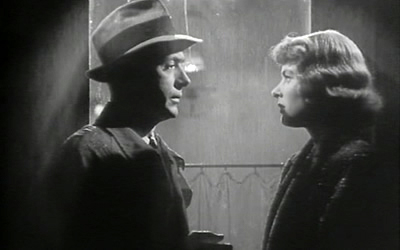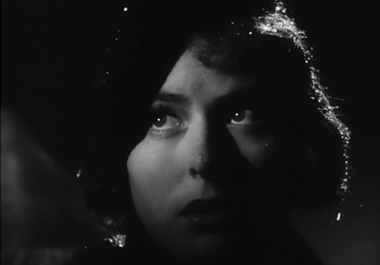
 |
|
|
|
One of several independent film companies attempting to establish a foothold in Hollywood was Enterprise Productions, which generated a string of quality pictures in the late 1940s. Enterprise's directors included Andre De Toth (Ramrod), Abraham Polonsky (Force of Evil) and Max Ophüls (Caught), but its only box office hit was Robert Rosson's Body and Soul with John Garfield. Enterprise's biggest production is director Lewis Milestone's Arch of Triumph, from a novel by the noted Erich Maria Remarque, who had earlier written the source novel for Milestone's anti-war classic All Quiet on the Western Front. Producer David Lewis scored a coup by securing the services of stars Ingrid Bergman and Charles Boyer. After only a few years in Hollywood, Bergman had been nominated for Best Actress three times and won once, opposite Boyer in Gaslight. Remarque's story took place in Paris just prior to the Nazi invasion, a place and time that Bergman had made her own in the wildly popular romantic thriller Casablanca. The highly anticipated movie seemed a guaranteed hit. But author Remarque wrote few romances with happy endings. Having fled the Nazis, Austrian doctor Ravic (Charles Boyer) is an undocumented, stateless political refugee living in Paris. He earns money by practicing in secret. Helping maintain Ravic's anonymity is his best friend Maurice (Louis Calhern), a former Russian colonel who now works as a doorman at the Scheherazade Café. Ravic prevents a suicide by Joan Madou (Ingrid Bergman), an Italian-Romanian refugee who has taken a succession of lovers to survive. He cannot resist falling in love with her. Living by night and avoiding police, they travel to Antibes on the French Riviera. There Joan attracts the attention of various playboys, including the wealthy & possessive Alex (Stephen Bekassy). Ravic becomes unsure of Joan's love. Back in Paris, Ravic catches a glimpse of a portly German on the streets of Paris, a man who may be Ivon Haake (Charles Laughton), the Nazi torturer who murdered Ravic's lover in Austria. Ravic is dead set on killing Haake, if he ever sees him again. 
Arch of Triumph has been out of circulation for so long that fans of Ingrid Bergman will consider it a major discovery. Charles Laughton's following also jumps at the chance to see him in something 'new'. Unfortunately, the beautifully produced and directed film was a major box office flop. Neither an escapist romance nor an audience-friendly thriller, it's a grim drama about disillusioned and desperate people. By 1948 audiences no longer welcomed stories about political misery in Europe. They had embraced the wartime morale booster Casablanca mainly because of Bogie and Bergman. Warner's well made Confidential Agent starred Charles Boyer as a Spanish Republican dodging Franco agents in wartime England. Audiences didn't care about the issues involved, and noticed only that Boyer and co-star Lauren Bacall didn't generate much romantic chemistry. Carol Reed's The Third Man was a notable exception to this trend. 1 Audiences liked political complexity even less in the 1940s than they do now. Arch of Triumph was labeled as 'sluggish' and unfocused, which we can now read as, "doesn't follow the accepted pattern for wartime romance stories." The movie is surprisingly adult in its outlook. Ingrid Bergman's Joan Madou has fled to Paris. Unable to work, her only way to live is to find a man to take care of her. Dr. Ravik comes upon her because her lover has died in her bed. Terrified that the French police will nab her, she feels like a common prostitute. He's demoralized as well. It's a decidedly downbeat romance. Arch of Triumph is fairly faithful to the novel by Erich Maria Remarque, one of the few authors who wrote passionately about civilians displaced by the upheavals of war. It's in the same vein as Remarque's novel Flotsam, an 'annihilating epic' in which half a dozen characters fleeing Nazi Germany roam across Europe looking for a non-existent haven. It was made into the impressive Sam Wood movie So Ends Our Night. Pushed from one country to another, refugees must live like criminals to avoid being sent back to prison or death in Germany. It's a story of betrayals, murders and noble suicides. So Ends Our Night was released in 1941 just as conditions turned grim for these stateless refugees. Most had fled to the haven of France, and when the Germans invaded, the majority were rounded up and sent to an unknown fate. 2 Unlike the desperate nomads of So Ends Our Night, Dr. Ravik hasn't had to walk halfway across Europe. He has some money and earns more practicing medicine on the sly. Close friend Maurice makes him welcome at the nightclub and tips him to potential trouble. Ravik is able to slip away to the South of France for a vacation with Joan. But their happiness could end at any moment. One slip-up would mean arrest and deportation to Germany, where the torturer Ivon Haake would surely finish him off. 
The movie benefits from director Milestone's formalism and attention to character detail. The lighting, sets and costumes are more realistic than we expect. Nervous pre-war Paris is seen mostly by night. The movie offers noir atmosphere, incipient doom and the haunted face of Ingrid Bergman. A screenwriting analyst would surely find fault with the movie's structure. Ravik and Joan's trip to Antibes dissipates much of the story's tension. How tough can things be when she's having a fine time in fancy dresses? We can see audiences wondering what's going on, as the rich are happily gambling even on the brink of war. The script also fumbles Ravik's vendetta against Ivon Haake. A flashback to a torture chamber (cue silhouette images) seems to come from a horror movie. At one point Ravik is arrested and spends months in Germany before escaping and returning to Paris. As most of this happens off-camera, we can't fully appreciate the hardships being suffered by thousands of refugees. The movie also fails to utilize the talented Charles Laughton. Ivon Haake is only in the movie for a scene or two, and has no scenes with Ingrid Bergman. No longer in uniform, the German is apparently commuting between Berlin and Paris to prepare a secret police network for the coming occupation. Arch of Triumph is true to the novel (and history) but the audience must have felt cheated to be deprived of a 'big' Laughton scene. What does work well is the romantic fireworks between Bergman and Boyer. The lovers only slowly reveal their feelings for each other, and are prevented from full commitment by their refugee status. When Ravik comes back from exile he finds Joan living in a swank apartment provided by the wealthy Alex. He forgives Joan and even gives her time to detach from Alex, who isn't happy that Ravik has re-entered the picture. But war is declared before any of this can be resolved. Ravik spots Ivon Haake again and prepares his trap. 
As we expect, Ingrid Bergman comes through with an absorbing performance. She positively glows as a troubled woman whose life is out of control. The contradictions in Joan Madou remind us of films from the 1970s, when screen characters were allowed to be complex or ambiguous. Charles Boyer is also good but Milestone underplays the suicidal streak in Ravic's drive to kill Haake, and instead treats the doctor as more of a righteous avenger. Thus we expect a much bigger comeuppance for Haake. Postwar audiences enjoyed dark stories, but the unsentimental Arch of Triumph asks them to be concerned about problems from a past they'd like to forget, and associated with uncomfortable politics. By 1948 America had aligned itself with occupied West Germany against new foreign enemies. We gave huge sums of money to charities helping displaced European orphans (see The Search) but mostly preferred to forget the ugly wartime situations chronicled by Erich Maria Remarque. The film's political complexity now seems much more attractive. We're accustomed to movies about people trapped in grim political binds -- the new A Most Wanted Man is a spy movie that sympathizes with a stateless asylum seeker navigating a dangerous path. Audiences in 1948 may have rejected Bergman and Boyer's characters because they weren't noble idealists and selfless lovers, as in Casablanca. That's probably what attracted Bergman to the role, and it's why the movie is so interesting now. Olive Films' Blu-ray of Arch of Triumph is a very good HD transfer of this hard-to-see picture. The show suffered a number of cuts either in reissue or when distributed to television, but UCLA has restored it to its full 133-minute running time. The images show some wear but Russell Metty's B&W cinematography looks terrific. The audio is also strong. 
Enterprise Productions put everything it had into Arch of Triumph, with production values the equal of any big studio film. But audiences didn't "discover" the film and it earned back less than a third of its budget. It was the beginning of dramatic career changes for Ingrid Bergman. Just a couple of years later her Hollywood career was destroyed by the scandal of her affair with Italian director Roberto Rossellini. The American press turned on Bergman with the kind of venom reserved for The Hollywood Ten, Charles Chaplin and the Rosenbergs. When she returned to American screens six years later, Arch of Triumph had been long forgotten. But fans of the actress will be happy to see her in such an interesting and demanding role. Let's hope that Erich Maria Remarque's So Ends Our Night can also be rescued from obscurity -- at the moment the only video copies available are in very poor condition.
On a scale of Excellent, Good, Fair, and Poor,
Arch of Triumph Blu-ray rates:
Footnotes:
1. The Third Man is a great movie, but it tempers the ugly realities of misery in post-war Vienna -- remember all those 'beautiful' ruins and that intoxicating zither music? The story concentrates most of its "evil" in one rotten apple, the black marketer Harry Lime. No fascist or communist grudges are being carried out; the U.S. really isn't involved. The American "hero" is a wishy-washy apolitical dreamer.
2. This is actually a fairly close parallel to what is happening in parts of Central America right now. Unable to survive in their own countries, the displaced poor have no place to go, and are inspired by tales of opportunity in the United States. Some are fleeing political terror and others have been forced off their land by globalized agriculture, but the effect is the same. Caught in an an economic and political bind, they've become criminalized, like Remarque's Flotsam.

Reviews on the Savant main site have additional credits information and are often updated and annotated with footnotes, reader input and graphics.
Review Staff | About DVD Talk | Newsletter Subscribe | Join DVD Talk Forum |
| ||||||||||||||||||